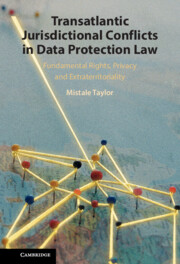58 results
Negotiating extra-settlement roads: Boundary making, administrative disputes, and power shifts in treaty-port Shanghai, 1860–1937
-
- Journal:
- Modern Asian Studies , First View
- Published online by Cambridge University Press:
- 27 May 2024, pp. 1-35
-
- Article
-
- You have access
- Open access
- HTML
- Export citation
4 - Jurisdiction and the Applicability of the European Convention on Human Rights
-
- Book:
- European Human Rights Grey Zones
- Published online:
- 18 April 2024
- Print publication:
- 25 April 2024, pp 95-142
-
- Chapter
- Export citation
JUSTICE IN THE LIMINAL: THE COUNCIL OF EUROPE AND THE RIGHT TO A HEALTHY ENVIRONMENT
-
- Journal:
- International & Comparative Law Quarterly / Volume 73 / Issue 2 / April 2024
- Published online by Cambridge University Press:
- 19 April 2024, pp. 319-360
- Print publication:
- April 2024
-
- Article
-
- You have access
- Open access
- HTML
- Export citation
5 - Reterritorialising International Law
-
- Book:
- The Rebirth of Territory
- Published online:
- 07 March 2024
- Print publication:
- 14 March 2024, pp 190-248
-
- Chapter
- Export citation
Organizational Improvisation, Architectural “Piggybacking,” and Masonic Networking in the International Settlement, Shanghai: Building an Anglican Cathedral, 1864–1869
-
- Journal:
- Enterprise & Society , First View
- Published online by Cambridge University Press:
- 06 March 2024, pp. 1-23
-
- Article
- Export citation
4 - Extraterritoriality
-
- Book:
- The Russia Sanctions
- Published online:
- 14 December 2023
- Print publication:
- 21 December 2023, pp 40-52
-
- Chapter
- Export citation
9 - The Geopolitical Implications of PatentHoldout and the Ensuing Race to the Home Court
- from Part V - Patent Enforcement, Wireless Markets, and Global Competitiveness
-
-
- Book:
- 5G and Beyond
- Published online:
- 14 December 2023
- Print publication:
- 21 December 2023, pp 195-214
-
- Chapter
-
- You have access
- Open access
- HTML
- Export citation
Building Castles in the Air? The EU Blocking Regulation and the Protection of the Interests of Private Parties
-
- Journal:
- Cambridge Yearbook of European Legal Studies , First View
- Published online by Cambridge University Press:
- 19 December 2023, pp. 1-17
-
- Article
-
- You have access
- Open access
- HTML
- Export citation
THE TERRITORIAL REACH OF EUROPEAN UNION LAW: A PRIVATE INTERNATIONAL LAW ENQUIRY INTO THE EUROPEAN UNION'S SPATIAL IDENTITY
-
- Journal:
- International & Comparative Law Quarterly / Volume 73 / Issue 1 / January 2024
- Published online by Cambridge University Press:
- 14 December 2023, pp. 29-63
- Print publication:
- January 2024
-
- Article
- Export citation
Where has all the money gone? Materiality, mobility, and nothingness
-
- Journal:
- Finance and Society / Volume 1 / Issue 1 / 2015
- Published online by Cambridge University Press:
- 09 November 2023, pp. 7-19
-
- Article
-
- You have access
- Open access
- Export citation
1 - Bonins of Contention
-
- Book:
- Japan's Ocean Borderlands
- Published online:
- 06 July 2023
- Print publication:
- 27 July 2023, pp 21-53
-
- Chapter
- Export citation
The Catalan Centre for Business and Human Rights: Addressing Extraterritorial Corporate Human Rights Abuses at the Subnational Level
-
- Journal:
- Business and Human Rights Journal / Volume 8 / Issue 2 / June 2023
- Published online by Cambridge University Press:
- 20 June 2023, pp. 277-283
-
- Article
- Export citation
6 - Seeking Justice and Recognition
-
- Book:
- Neutrality and Collaboration in South China
- Published online:
- 01 June 2023
- Print publication:
- 15 June 2023, pp 236-272
-
- Chapter
- Export citation
Extra-territoriality and the UK Insolvency Act 1986
-
- Journal:
- Legal Studies / Volume 44 / Issue 1 / March 2024
- Published online by Cambridge University Press:
- 08 May 2023, pp. 45-64
- Print publication:
- March 2024
-
- Article
-
- You have access
- Open access
- HTML
- Export citation
4 - Limits That Public International Law Poses on the European Union Safeguarding the Fundamental Right to Data Protection Extraterritorially
-
- Book:
- Transatlantic Jurisdictional Conflicts in Data Protection Law
- Published online:
- 06 April 2023
- Print publication:
- 13 April 2023, pp 57-94
-
- Chapter
- Export citation
1 - Introduction
-
- Book:
- Transatlantic Jurisdictional Conflicts in Data Protection Law
- Published online:
- 06 April 2023
- Print publication:
- 13 April 2023, pp 1-17
-
- Chapter
- Export citation
3 - The European Union’s Obligations to Safeguard the Fundamental Right to Data Protection Extraterritorially
-
- Book:
- Transatlantic Jurisdictional Conflicts in Data Protection Law
- Published online:
- 06 April 2023
- Print publication:
- 13 April 2023, pp 33-56
-
- Chapter
- Export citation

Transatlantic Jurisdictional Conflicts in Data Protection Law
- Fundamental Rights, Privacy and Extraterritoriality
-
- Published online:
- 06 April 2023
- Print publication:
- 13 April 2023
4 - State Jurisdiction and Immunities
-
- Book:
- German Practice in International Law
- Published online:
- 09 February 2023
- Print publication:
- 16 February 2023, pp 132-156
-
- Chapter
- Export citation
5 - European Union Member State
- from Part II - Perspective of the European Union and Its Member States
-
- Book:
- The European Union, Emerging Global Business and Human Rights
- Published online:
- 10 November 2022
- Print publication:
- 17 November 2022, pp 187-210
-
- Chapter
- Export citation



